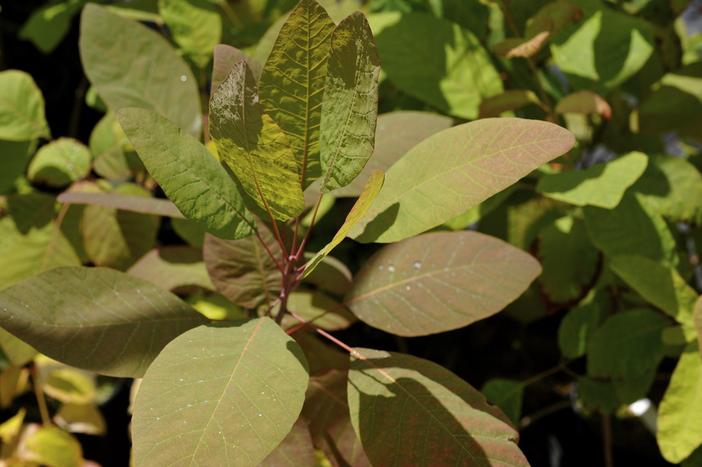American Smoketree
(Cotinus obovatus)
American Smoketree (Cotinus obovatus)
/
/

Megan Hansen
CC BY-SA 2.0
Image By:
Megan Hansen
Recorded By:
Copyright:
CC BY-SA 2.0
Copyright Notice:
Photo by: Megan Hansen | License Type: CC BY-SA 2.0 | License URL: https://creativecommons.org/licenses/by-sa/2.0/ | Uploader: MeganEHansen | Publisher: Flickr


























Estimated Native Range
Summary
Cotinus obovatus, commonly known as American Smoketree, is a deciduous tree or large shrub native to rocky outcrops and open woodlands in the Central and Southeastern United States. It typically grows to a height of 10 meters (33 feet) and a width of 8 meters (26 feet), with a rounded, multi-stemmed habit. The oval leaves, up to 12 cm (5 inches) long, are blue-green in summer and turn a brilliant scarlet in autumn, providing some of the most intense fall color of any tree species. In summer, it produces large, fluffy, pink-grey panicles of flowers that create a smoky haze around the plant, hence the name "Smoketree." The smokey effect is due to the clusters of hairs on the spent flower stalks. This species is dioecious, meaning male and female flowers are on separate plants.
American Smoketree is valued for its striking fall foliage and unique flower display. It is often used in landscape design as a specimen plant or in shrub borders, and is also suitable for naturalized areas. While it is adaptable to a range of soil types, it prefers well-drained soils and can tolerate drought once established. Full sun is ideal for the best flowering and fall color. It is relatively low maintenance, but can be affected by Verticillium wilt and root rot if grown in poorly drained soils. Despite its beauty, it is not commonly found in cultivation due to its slow growth rate and difficulty in propagation.CC BY-SA 4.0
American Smoketree is valued for its striking fall foliage and unique flower display. It is often used in landscape design as a specimen plant or in shrub borders, and is also suitable for naturalized areas. While it is adaptable to a range of soil types, it prefers well-drained soils and can tolerate drought once established. Full sun is ideal for the best flowering and fall color. It is relatively low maintenance, but can be affected by Verticillium wilt and root rot if grown in poorly drained soils. Despite its beauty, it is not commonly found in cultivation due to its slow growth rate and difficulty in propagation.CC BY-SA 4.0
Plant Description
- Plant Type: Tree, Shrub
- Height: 20-30 feet
- Width: 20-30 feet
- Growth Rate: Moderate
- Flower Color: Purple, Pink
- Flowering Season: Spring, Summer
- Leaf Retention: Deciduous
Growth Requirements
- Sun: Full Sun, Part Shade
- Water: Low, Medium
- Drainage: Slow, Medium, Fast
Common Uses
Bank Stabilization, Bee Garden, Bird Garden, Butterfly Garden, Deer Resistant, Drought Tolerant, Rabbit Resistant, Showy Flowers, Street Planting
Natural Habitat
Rocky outcrops and open woodlands
Other Names
Common Names: Chittamwood, American Smokewood
Scientific Names: , Cotinus obovatus, Cotinus americanus, Rhus cotinoides, Cotinus cotinoides, Cotinus ellipticus, Cotinus retusus,
GBIF Accepted Name: Cotinus obovatus Raf.